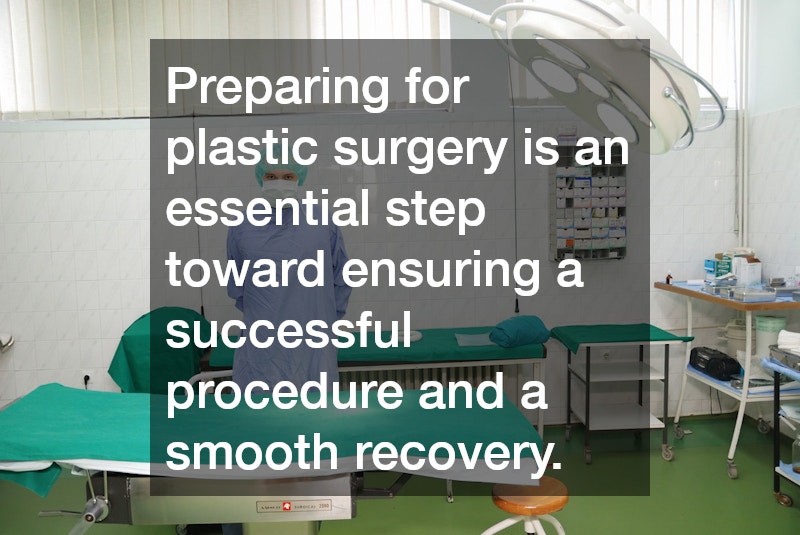
Deciding to undergo plastic surgery is a significant step, whether you’re pursuing cosmetic enhancements or reconstructive procedures. Like any surgery, preparation is crucial for a successful outcome and smooth recovery. Knowing how to get ready for your plastic surgery procedure can help you feel more confident and relaxed, ensuring that everything goes as planned. From consultations to post-operative care, this guide will walk you through the steps you need to take to prepare for your procedure.
1. Consultation with Your Plastic Surgeon
The first and most important step in preparing for your plastic surgery is a thorough consultation with your surgeon. During this meeting, you’ll discuss your goals, medical history, and expectations for the surgery.
The surgeon will evaluate your overall health and recommend the best approach based on your needs.
What to Discuss:
- Your reasons for seeking plastic surgery
- Any medications or supplements you’re taking
- Past surgeries or medical conditions
- Allergies or reactions to anesthesia
- Your desired outcome and potential concerns
This consultation is also an opportunity to ask any questions about the procedure, recovery time, and the surgeon’s experience. Choosing a board-certified plastic surgeon with a solid track record is key to achieving safe and satisfying results. Take the time to research and ensure your surgeon is fully qualified and experienced in the specific procedure you’re undergoing.
2. Follow Pre-Surgery Instructions
After your consultation, your plastic surgeon will provide you with a list of pre-surgery instructions tailored to your procedure and health condition. These guidelines are critical for ensuring a smooth operation and reducing the risk of complications.
Common Pre-Surgery Guidelines:
- Stop Smoking: Smoking can hinder your body’s healing process and increase the risk of complications. Most surgeons recommend stopping smoking at least four weeks before surgery.
- Avoid Certain Medications: Blood-thinning medications, such as aspirin, ibuprofen, or herbal supplements like ginkgo biloba, can increase the risk of bleeding. Your surgeon may advise you to stop taking these medications at least two weeks before surgery.
- Fasting: If general anesthesia is required, you may need to fast (no food or drink) for 8-12 hours before the procedure.
- Hydrate: Staying well-hydrated in the days leading up to surgery is important for overall health and recovery. However, follow your surgeon’s instructions regarding fluids on the day of surgery.
Make sure you follow all of your surgeon’s pre-operative guidelines to help ensure the best possible outcome from your plastic surgery.
3. Plan for Your Recovery
A successful plastic surgery procedure doesn’t end when you leave the operating room—recovery plays a huge role in achieving your desired results. Planning for your recovery ahead of time will help ensure you can rest and heal properly.
Create a Comfortable Recovery Space: Prepare a recovery area in your home with all the essentials within arm’s reach. This can include:
- Comfortable pillows and blankets to support your body
- Easy access to entertainment, like books, movies, or podcasts
- Medications and water
- Healthy snacks and meals that are easy to eat
Arrange for Help: Many plastic surgery procedures will require you to have someone available to drive you home and stay with you for at least the first 24 hours. Depending on the type of surgery, you may need help with daily tasks, such as cooking, cleaning, or caring for children.
Time Off Work: Consult with your surgeon about the recovery timeline and plan to take the necessary time off work or other responsibilities. Some plastic surgeries may require only a few days of rest, while others could take weeks before you can resume normal activities.
4. Prepare for Physical Changes
Whether you’re undergoing a cosmetic procedure like a facelift or reconstructive plastic surgery, it’s important to mentally prepare for the physical changes that will occur. While the ultimate goal is to enhance your appearance or improve functionality, the initial results may include swelling, bruising, or bandages that temporarily alter how you look.
Post-Surgery Side Effects:
- Swelling and bruising are normal and expected in the days or weeks following plastic surgery.
- Bandages, surgical drains, or stitches may be part of your post-operative care.
- Some discomfort, including soreness or tightness, is common but can be managed with medications prescribed by your surgeon.
Remember that your final results may not be immediately visible and can take several weeks to months to fully settle.
5. Practice a Healthy Lifestyle Before Surgery
Adopting a healthy lifestyle before your surgery will help optimize your body for healing and improve your surgical results.
Diet and Nutrition:
- Eating a well-balanced diet rich in vitamins, minerals, and protein is essential for tissue repair and recovery. Foods high in antioxidants, such as fruits and vegetables, can promote healing and reduce inflammation.
- Avoid alcohol, as it can interfere with medications and slow down the recovery process.
Exercise:
- Staying active and physically fit before surgery will help your body recover faster. However, avoid intense workouts in the days leading up to your surgery as you prepare for a period of rest.
6. Mentally Prepare for Surgery
Undergoing plastic surgery is a physical and emotional journey. Taking time to mentally prepare for the process can reduce anxiety and make you feel more in control.
Managing Expectations: It’s essential to have realistic expectations about the outcome of your surgery. While plastic surgery can enhance your appearance or improve functionality, it may not completely change who you are. Discussing these expectations with your surgeon can help you feel more confident and comfortable with your decision.
Practice Relaxation Techniques: If you feel nervous about the procedure, try relaxation techniques such as deep breathing exercises, meditation, or yoga. Staying calm and centered before surgery can contribute to a smoother experience.
Preparing for plastic surgery with Dr. Chiasson is an essential step toward ensuring a successful procedure and a smooth recovery. By consulting with your plastic surgeon, following pre-surgery instructions, planning for your recovery, and adopting a healthy lifestyle, you can help make your experience as stress-free as possible. Remember that plastic surgery is not just about the procedure itself but also about the recovery journey and the mental and physical preparation required to achieve the best possible results.
.




